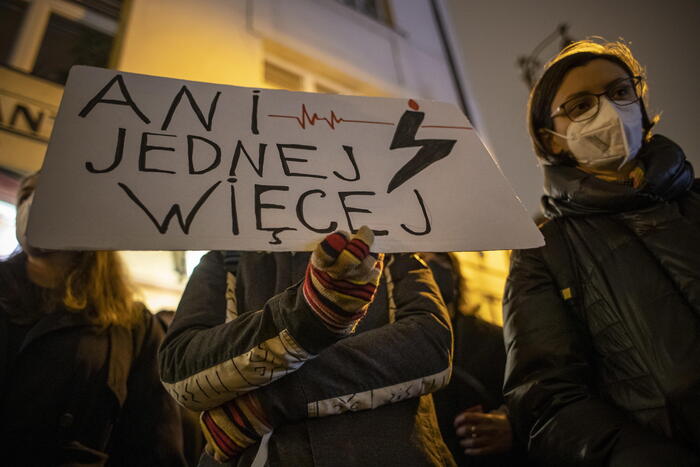In an election year and with a cracked government coalition, Spain on Thursday approved two controversial laws that allow decisions to be made,
such as terminating a pregnancy or changing sex
, from the age of 16.
It will only be necessary to express the will to want to do it.
Fostered by the Ministry of Equality, which in the distribution of portfolios between the PSOE and Unidas Podemos when they formed a government in 2020 was left in the hands of Podemos, the two laws that Parliament approved this Thursday are two achievements of the ministry of Irene Moreno and live
the bonfire of the crisis between the government partners.
The modification to the abortion law, which the PSOE-Podemos coalition agreed to in a cabinet meeting months ago, finally saw its parliamentary approval this Thursday and will enter into force as soon as it is published in the Official State Gazette.
Its main and controversial focus is on the female free will to
terminate the pregnancy from the age of 16
, without the need for the approval of the parents who might not even find out.
An activist celebrates in front of the Spanish Congress, in Madrid on February 16, 2023 after the 'transgender law' was voted on.
AFP photo
The new law guarantees abortion in public hospitals and also eliminates the three-day reflection period that the previous regulations established so that the decision was not the result of an outburst.
It also creates
a register of objectors
for those doctors and health personnel who are not willing to perform an abortion.
And add, on the other hand, the possibility that
women who suffer from painful periods
can take days off from their jobs.
“Safe and public abortion so as not to die.
Contraceptives to avoid abortion and comprehensive sexual education to decide, to be free and to be happy”, celebrated the Minister of Equality, Irene Montero, the main promoter of the modification of the law.
“The path of this law that expands the sexual and reproductive rights of women does not end with this vote or with the publication of this law in the Official State Gazette.
There will be resistance to the application
of this law just as there has been and will be resistance to the application of all feminist laws.
We have to work”, insisted the minister.
"That in all public hospitals in our country there are enough personnel to practice voluntary interruptions of pregnancy, respecting, of course, the right to conscientious objection of health personnel who decide to object," Montero said.
The law was approved despite
the votes against by the deputies of the Popular Party (PP) and Vox.
The debate opened a rift between the PSOE and Podemos.
Photo Reuters
"We reject this bill as untimely, unnecessary, infantilized, intolerant, inappropriate, incongruous," said Marta González Vázquez, from the PP.
Although contrary to the modification of the law, the PP remained entangled in its own web on whether or not abortion is a right based on statements by its president, Alberto Núñez Feijóo.
Since abortion returned to the debate in Spain,
where it has been legal since 1985
, Núñez Feijóo balances so as not to disappoint sensibilities within his party, some of which defend "the right to life" over any other.
"Abortion is a right that women have within the law," Núñez Feijóo said a few days ago.
“It is a woman's decision that can only be adopted in accordance with the legislation.
I do not consider that abortion is a fundamental right because it is not included in the Human Rights convention.
It can always be produced strictly within the terms of the law,” she noted.
Vox also voted against the modification that was approved this Thursday.
“What scandalizes me is that someone who kills a rat is sentenced to prison (in reference to the animal welfare law also approved this week in Congress)
while a child can be freely killed in its mother's womb
.
That is sadism,” said Lourdes Méndez Monasterio, a deputy for the far-right party.
Change sex just by expressing the desire
The greatest tension in the Congress of Deputies, however, came when it was the turn to debate another of the regulations that were on the agenda: the approval
of the trans law
, one of the star proposals of the Ministry directed by Irene Montero .
The law for the real and effective equality of trans people and for the guarantee of the rights of LGTBI people - an acronym that includes lesbians, gays, transsexuals, bisexuals and intersex - establishes that, from the age of 16, it is possible
to change the sex on the DNI without therapeutic requirements.
Spain's Minister for Equality, Irene Montero (L), celebrates with activist and first transsexual elected to Parliament, Carla Antonelli (R) in front of Congress.
Photo Reuters
Between the ages of 14 and 16
it can also be done if the parents agree and support the free self-determination of their children.
Yes, judicial authorization will be necessary for those between 12 and 14 years of age.
This was one of the breaking points within the government coalition: the PSOE proposed that judicial authorization be a requirement for the change of sex of those under 16 years of age, but it was unable to change the Podemos proposal.
Critical voices were raised from some sectors of feminism but the most obvious break was carried out by the former vice president of the government of Pedro Sánchez and current president of the Congressional Equality Commission, the socialist Carmen Calvo, who this Thursday abstained from voting
.
“I agree that there is a law, but not this law,” Calvo said months ago.
"I am fundamentally concerned about the idea of thinking that gender is chosen without more than mere will or desire, obviously putting the identity criteria of the rest of the 47 million Spaniards at risk," was his argument.
“Trans people are not sick people”
“This is a law that recognizes the right to self-determination of the gender identity of trans people, depathologizes trans identity.
Trans people are not sick people
.
They are people, period.
They are who they are, period.
Trans women are women, period.
And the State, as of today, recognizes you, period”, said Minister Montero this Thursday looking towards the stands from where members of the trans and LGTBI collectives followed the debate in the congressional chamber.
When the law enters into force, it will be possible to change sex in the civil registry from the age of 16
without the need to present medical
or psychological reports that demonstrate gender dysphoria, nor will it be taken into account if the person requesting the sex change in your documents you are undergoing hormonal treatments or surgeries.
The law also contemplates that lesbians, bisexuals and trans people who may become pregnant have access to assisted reproduction treatment.
And that couples can register their children as their own without having to be married.
Discriminatory acts will be considered infractions.
A sanctions regime will be created that
can reach 150 thousand euros.
“This will not serve to end discrimination or the suffering of trans people and LGTBI people.
Neither desires are rights nor is this debate lost nor is there an iota of hatred in our opposition to this law," said deputy María Ruiz, from Vox, a party that also voted against this law.
“Their stumbling blocks and stubbornness harm the Spaniards, especially children and women.
We are not to experiment with people
.
We do not want this law to begin a new unbearable count of victims days after this law was published in the BOE (Official State Gazette), "said deputy María Jesús Moro Almaraz, from the PP.
Moro Almaraz thus made reference to the greatest discrepancy that deepens the wear and tear between the PSOE and Podemos: the recent approval of the sexual freedom law -another of the initiatives of Irene Montero's ministry- that, considering sexual assault any contact in
which In the absence of consent
, it caused a modification in the penalties for sexual crimes that ended up benefiting, up to now, more than fifty already convicted sexual offenders.
President Pedro Sánchez rushes a modification that corrects this bleeding and his parliamentary group presented a proposal without having agreed on it with Podemos, which does not resign itself to releasing a law that it considers another achievement of its management and wants to agree on the correction of the norm with the PSOE .
This Thursday, however, Podemos celebrated what it considers another progressive advance of its own.
Irene Montero, who had to listen to the requests for resignation made by the PP and Vox in the chamber, came out smiling to the courtyard of Congress.
Wrapped in a transgender flag, she was photographed with some people who had attended the debate and were celebrating the approval of the law.
“For this trip, so many saddlebags were not needed.
It was a question of human rights
”, said the former socialist deputy of the Madrid Assembly -the autonomous Parliament- Carla Antonelli, the first trans parliamentarian in Spain who left the PSOE after disputes within her party over the law that was finally approved this Thursday.
bp
look too
"I want my pediatrician": massive march in Madrid in defense of public health
Díaz Ayuso: "America is a Hispanic work" threatened by "the evil" that is organized in "electoral processes"






/cloudfront-eu-central-1.images.arcpublishing.com/prisa/OCS7V4Q6YKB6UMI76BXPPNGQJE.jpg)








